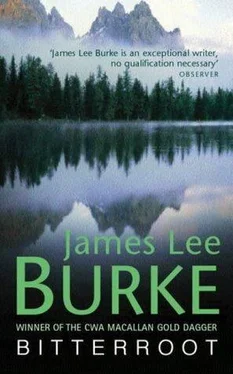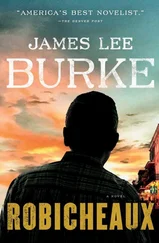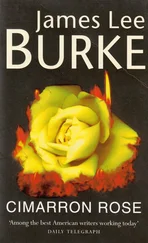"That's just Billy Bob. You watch. He'll be taking us out to dinner."
But he might as well have been talking to the wind. She started the car, and they drove along the highway, past the sawmill, through the willow-lined streets of Bonner. The car had no windshield and Sue Lynn's hair kept whipping in her face.
He looked at her Roman profile, the coffee-and-milk color of her skin, a threadlike white scar on her cheek, the soft purple hue of her mouth. He wanted to touch her, but her silence and the roar of the gutted muffler against the asphalt fed his irritation and ineptitude.
"Why do you drive a junker like this, anyway?" Lucas said.
"Because I live in a junkyard. Because the government tells me what I have to do. Because I don't have choices about my life," she said.
Her hands had tightened on the wheel. When she looked over at him her eyes were blazing.
"Pull over," he said.
"No!"
"Stop acting like you got to talk in code. It's a real drag, Sue Lynn," he said, and grabbed the wheel so that the car drove across the opposite lane onto a flat turnaround above a sandy beach that flanged the Blackfoot River.
"I made a mistake. I shouldn't have gone to the dance with you. Wyatt Dixon and Carl Hinkel and their friends are animals. They'll tear you in pieces," she said.
"Back home their kind are a dime a tote sack." "You're just a boy. You don't know what you're talking about."
She got out of the car. He thought she was going to kick the door, but instead she stared silently at the river, the wind blowing her hair in her face, a look of regret in her eyes that he couldn't explain.
"I'm sorry for getting mad. I like you a lot, Sue Lynn. But I ain't no kid and you got to stop talking to me like I am one," he said.
"I'm not who you think I am, Lucas. I'm not a good person," she said.
She walked down a footpath to the beach. Five college boys in swim trunks were sitting in the shadow of a huge egg-shaped rock, drinking beer and sailing a red Frisbee out on the river for a mongrel dog to retrieve. Each time the dog brought back the Frisbee, one of the boys would give it a piece of hamburger bun.
Lucas caught up with Sue Lynn by the water's edge. The Frisbee sailed like a dinner plate past her head and landed far out in the current. The dog splashed into the water and swam after it. Its back was lesioned with mange, its ribs etched against its sides.
"What gives you the right to be saying you're no good? That's like telling folks who believe in you they're stupid," Lucas said.
"I'm going to drive you back home now," she said.
"Billy Bob give me two tickets to the Joan Baez concert at the university," he lied.
"I'm glad I met you, Lucas, but I'm not going to see you again."
"That's a rotten damn way to be," he replied.
"One day it'll make sense to you."
"Right," he said.
The dog had just returned the Frisbee to one of the college boys and was trying to nose a piece of bread out of the sand. The dog was trembling with exhaustion, the wet hair on its hindquarters exposing the emaciated thinness of its legs. The college boy flung the Frisbee through the air again. It plopped on top of the riffle and floated downstream.
"Just a minute," Lucas said to Sue Lynn.
He waded into the river and picked up the Frisbee and walked to the shade of the rock, where the college boys were sitting on blankets with an ice chest set among them. They were suntanned and hard-muscled, innocently secure in the knowledge that membership in a group of people such as themselves meant that age and mortality would never hold sway in their lives.
"This dog's wore out. If you want to feed him, why not just do it? Don't make him drown hisself to get a little food," Lucas said.
One of the boys propped himself up on his elbow and squinted into the sun with one eye.
"You think that up all by yourself?" he asked.
"It's five of y'all, one of me. I know what you can do. But don't torment a dumb animal," Lucas said.
One of the other boys removed his sunglasses and started to his feet, sand sifting off of his body. But the boy who was propped on one elbow put a hand on his friend's arm.
"You got a point. Why don't you feed him?" he said, and tossed a sack of lunch trash to Lucas.
Lucas started up the trail, then knelt and gave the dog a half-eaten weenie.
"Hey, buddy, what's your name?" the college boy yelled after him.
"Lucas Smothers."
"How about throwing our Frisbee back, Lucas Smothers?"
Lucas sailed it through the air, then picked up the dog under the stomach and put it into the backseat of Sue Lynn's car.
Sue Lynn had watched it all without saying a word. Now she was staring at him with a strange light in her face, pushing her hair out of her eyes, tilting her chin up as though she were having a conversation with herself.
"What's wrong?" he asked.
"Nothing," she said.
"I'd better get home. Billy Bob gets in trouble if I ain't around."
"You want to drive?" she asked.
"I don't mind."
They headed up the highway, following the Blackfoot, through timbered canyons and meadow-land, through sunlight and shady areas where spring-water leaked across the asphalt. The dog was already sound asleep on the backseat. Sue Lynn moved closer to Lucas and took his right hand off the steering wheel and held it in hers.
When he looked over at her, her gaze was focused straight ahead, her eyes sleepy with thoughts he couldn't fathom.
Tell me women ain't a puzzle, he thought.
The next day I drove to a Catholic church in Missoula's university district. The chapel area was empty, the confessional booths stacked with furniture. A secretary in the pastor's office told me I could find the pastor at his home down the street. I walked a block under maple trees to a tan stucco house with a neat yard and tulip beds and saw a tall man in an undershirt and black trousers up on the roof.
"Can I help you?" he said, peering down through an overhang of maple leaves.
"I'd like to go to Reconciliation," I replied.
"You have a problem with heights?"
I climbed the ladder and joined him in a flat, sunless place where he had hung his tool bag on the chimney and was eating his lunch. The blueness of the sky overhead looked like a river through a gap in the canopy of the maple trees, as though the earth were turned upside down and we were viewing a riparian landscape from high above.
The priest's name was Hogan and he offered me a sandwich from his lunch sack. He talked politely for a moment, then realized the origin of my awkwardness with the ritual that Catholics today call Reconciliation.
"You're not a cradle Catholic?" he asked.
"I was baptized by immersion in a fundamentalist church when I was a child. I became a convert after the loss of a friend."
"You want to tell me what's bothering you?"
"I went to bed with a woman. It was a self-serving act, impulsive and badly thought out," I said.
"I'm getting the sense things didn't turn out as you planned."
"That's an understatement, sir."
"I'm not quite sure what we're owning up to here. You mean you acted lustfully or you feel you've used somebody, or you simply regret getting involved with the wrong person?"
"How about all of the above?"
"I see."
"I've done this previously. For reasons that mask a more grave sin in my past."
"I'm not sure I follow," he said.
In the silence I could hear the maple branches sweeping against the roof.
"I accidentally shot and killed my best friend. I did this while we were killing other men. His death is with me morning and night. His specter never leaves me," I said.
The face of the priest remained impassive, but he lowered his eyes so I could not see the sadness in them.
Читать дальше












